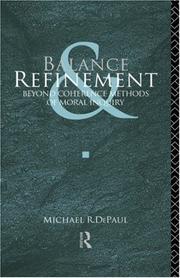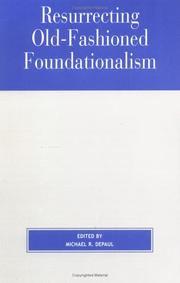| Listing 1 - 3 of 3 |
Sort by
|

ISBN: 1134952325 1282373242 9786612373244 0203004183 9780203004180 9780415042208 0415042208 0415042208 9781134952274 9781134952311 9781134952328 9780415522069 1134952317 Year: 1993 Publisher: London ; New York : Routledge,
Abstract | Keywords | Export | Availability | Bookmark
 Loading...
Loading...Choose an application
- Reference Manager
- EndNote
- RefWorks (Direct export to RefWorks)
We all have moral beliefs. But what if one beleif conflicts with another? DePaul argues that we have to make our beliefs cohere, but that the current coherence methods are seriously flawed. It is not just the arguments that need to be considered in moral enquiry. DePaul asserts that the ability to make sensitive moral judgements is vital to any philosophical inquiry into morality. The inquirer must consider how her life experiences and experiences with literature, film and theatre have influenced her capacity for making moral judgments and attempt to ensure that this capacity is neither naive

ISBN: 1461715164 9781461715160 1306151740 9781306151740 0847692884 9780847692880 0847692892 9780847692897 Year: 2001 Publisher: Lanham, Maryland : Rowman & Littlefield,
Abstract | Keywords | Export | Availability | Bookmark
 Loading...
Loading...Choose an application
- Reference Manager
- EndNote
- RefWorks (Direct export to RefWorks)
Knowledge, Theory of. --- Truth. --- Conviction --- Belief and doubt --- Philosophy --- Skepticism --- Certainty --- Necessity (Philosophy) --- Pragmatism --- Epistemology --- Theory of knowledge --- Psychology --- Foundationalism (Theory of knowledge) --- Knowledge, Theory of

ISBN: 0199252734 0199219125 0191719285 128134608X 0191530972 9780191530975 Year: 2003 Publisher: Oxford : New York : Clarendon ; Oxford University Press,
Abstract | Keywords | Export | Availability | Bookmark
 Loading...
Loading...Choose an application
- Reference Manager
- EndNote
- RefWorks (Direct export to RefWorks)
The idea of a virtue has traditionally been important in ethics, but only recently has gained attention as an idea that can explain how we ought to form beliefs as well as how we ought to act. Moral philosophers and epistemologists have different approaches to the idea of intellectual virtue; here, Michael DePaul and Linda Zagzebski bring work from both fields together for the first time to address all of the important issues. It will be required reading for anyone working in either field. - ;Virtue ethics has attracted a lot of attention over the past few decades, and more recently there has
General ethics --- Theory of knowledge --- Virtue epistemology. --- Virtue. --- Philosophy --- Philosophy & Religion --- Speculative Philosophy --- Virtue epistemology --- Virtue --- Epistemic virtue --- Epistemology, Virtue --- Knowledge, Theory of --- Conduct of life --- Ethics --- Human acts
| Listing 1 - 3 of 3 |
Sort by
|

 Search
Search Feedback
Feedback About UniCat
About UniCat  Help
Help News
News